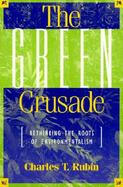Most people would assume that the environmental idea, and the powerful political movement it inspired, must have emerged in response to self evident environmental problems such as air and water pollution, acid rain, the human destruction of natural habitats, and the resulting extinction of endangered species. But as Charles T. Rubin shows in The Green Crusade, environmental problems are far from being a matter of common sense. He points out that while such situations almost certainly existed in the past, they were defined in different terms -- implying different kinds of social and political solutions.
Rubin tells the story of this massive yet strangely unnoticed transformation of public perception and social morality by focusing on the small group of influential writers and thinkers -- Rachel Carson, Barry Commoner, Paul Ehrlich, E.F. Schumacher, and others -- whose enormously popular writings gave birth to the environmental movement as we know it. Cutting through their pretense of presenting "common sense" ideasbased on sound scientific conclusions, Rubin's thoughtful discussion of these writers' political ideas refutes their pretensions to scientific accuracy and reveals the radical foundations of their project.


